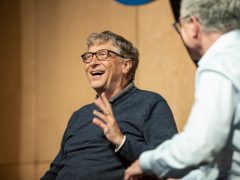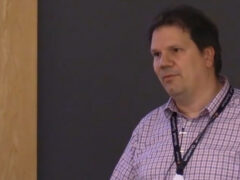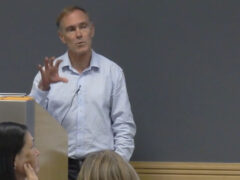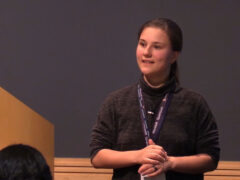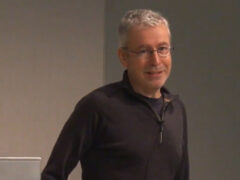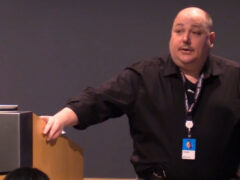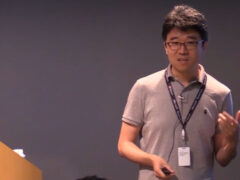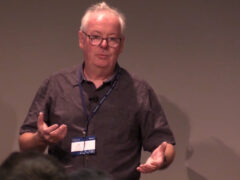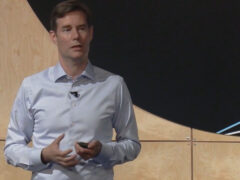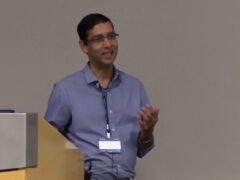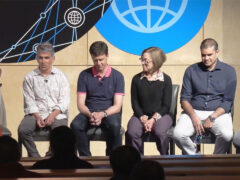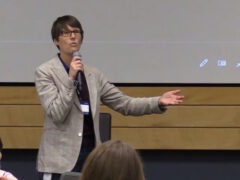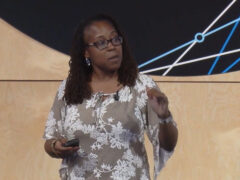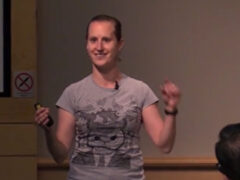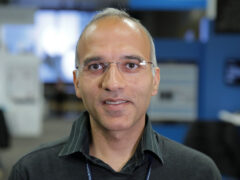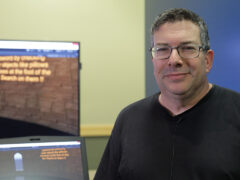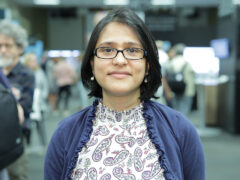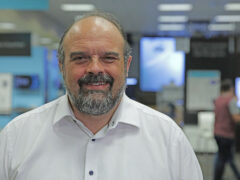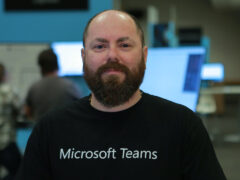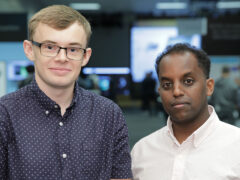Frontiers in Speech and Language
The last few years have witnessed a renaissance in multiple areas of speech and language processing. In speech recognition, deep neural networks have led to significant performance improvements; in language processing the idea of continuous-space representations of words and language has become mainstream; and dialog systems have advanced to the point where automated personal assistants are now everyday fare on mobile devices. In this session, we bring together researchers from the different disciplines of speech and language processing to discuss the key ideas that have made this possible, and the remaining challenges and next generation of applications.
Speaker Details
Jeff A. Bilmes is a professor at the Department of Electrical Engineering at the University of Washington, Seattle and an adjunct professor in Computer Science & Engineering and the department of Linguistics. He received his Ph.D. in computer science from the University of California in Berkeley. He is a 2001 NSF Career award winner, a 2002 CRA Digital Government Fellow, a 2008 NAE Gilbreth Lectureship award recipient, and a 2012/2013 ISCA Distinguished Lecturer. His primary interests lie in signal processing for pattern classification, speech recognition, language processing, bioinformatics, machine learning, graphical models, submodularity in combinatorial optimization and machine learning, active and semi-supervised learning, computer vision, and audio/music processing. Beginning work in this area in 2003, Prof. Bilmes is one of the first to utilize submodularity in machine learning problems.
Christopher Manning is a Professor of Computer Science and Linguistics at Stanford University. His Ph.D. is from Stanford in 1995, and he held faculty positions at Carnegie Mellon University and the University of Sydney before returning to Stanford. He is a fellow of ACM, AAAI, and the Association for Computational Linguistics. Manning has coauthored leading textbooks on statistical approaches to natural language processing (Manning and Schuetze, 1999) and information retrieval (Manning, Raghavan, and Schuetze, 2008). His recent work has concentrated on probabilistic approaches to natural language processing (NLP) problems and computational semantics, particularly including such topics as statistical parsing, robust textual inference, machine translation, large-scale joint inference for NLP, computational pragmatics, and hierarchical deep learning for NLP.
Dr. Dong Yu joined Microsoft Corporation in 1998 and the Microsoft Speech and Dialog Research Group in 2002, where he currently is a principal researcher. His current research interests include speech processing, robust speech recognition, discriminative training, and machine learning. He has published over 130 papers in these areas and is the coinventor of more than 50 granted/pending patents. The context-dependent deep neural network hidden Markov model (CD-DNN-HMM) he co-proposed and developed has been seriously challenging the dominant position of the conventional GMM based system for large vocabulary speech recognition. His this work was recognized by the IEEE SPS 2013 best paper award.
- Date:
- Speakers:
- Jeff A Bilmes, Christopher Manning, and Dong Yu
- Affiliation:
- University of Washington, Stanford University, Microsoft Research
-
-

Dong Yu
Principal Researcher
-
Jeff Running
-
Series: Microsoft Research Faculty Summit
-
-
Quantum Computing and Workforce, Curriculum, and Application Development: Case study
Speakers:- Krysta M. Svore,
- Martin Roetteler
-
-
-
-
Crowd, Cloud and the Future of Work: Updates from human AI computation
Speakers:- Besmira Nushi,
- Vani Mandava
-
-
-
-
-
-
-
Productivity in Software Development
Speakers:- Neel Sundaresan,
- Margaret-Anne Storey,
- Prem Kumar Devanbu
-
-
-
-
-
-
-
Accessible Virtual Reality
Speakers:- Eyal Ofek
-
Calendar.help: A Virtual Meeting Scheduling Assistant
Speakers:- Pamela Bhattacharya
-
Visual Studio IntelliCode
Speakers:- Mark Wilson-Thomas
-
Microsoft Teams: Collaborate with Any Researcher Anywhere
Speakers:- Jethro Seghers
-
Project Alava: Programming Webs of Microcontrollers
Speakers:- James Devine,
- Teddy Seyed
-
AI in PowerPoint
Speakers:- Kostas Seleskerov

